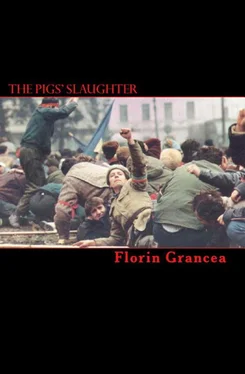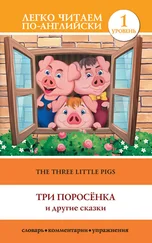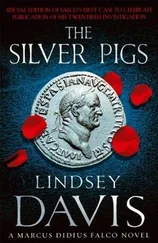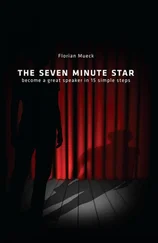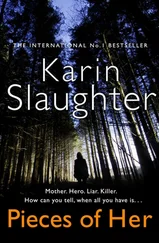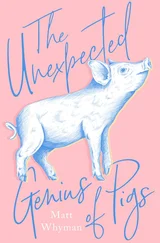My mom brought as entrées caltaboşi, tobă, cîrnaţi and sângerete, together with beef salad, a delicacy usually made with boiled chicken, because we didn’t have beef. It also contained boiled vegetables, pickles and mayonnaise, stuffed eggs, eggplant salads, mushroom salad made with mayonnaise, garlic and white cottage cheese.
Everything was on the table when we heard some loud knocks at the gate. It was strange. People never visit on Christmas Day. It had to be something important.
I wanted to go and check it out, but my father went instead. “Kids, set another place at the table and one more glass, coz we have a guest”, my father said in a very strange tone of voice. And then, addressing that visitor:
“You are very lucky to arrive just now, because they are about to show us how Ceauşescu got killed”.
Now, as they opened the door to come inside, I was halfshocked. I expected someone we knew, not a total strange. But, that man, whoever he was, was as shocked to see us, the entire family, including my grandmother, around that festive table. “Please, sit down”, said my father and his tone of voice wasn’t the one that he used for happy events, but the one that he used when my sister presented him with bad grades. My father was worried.
“Let’s eat, let’s drink” he said as our unexpected and unknown guest sat at the table without removing his winter coat. When I say “unknown” I mean that he wasn’t from our town. We knew everybody, all 10,000 people living in Avrig but that man wasn’t among them. That was really strange.
My father poured wine into the glasses, only a drop for grandmother and my mom, and I filled my glass and my sister’s glass with herb tea. It was the only drink we knew except some very difficult to get orange juice and Pepsi Cola. Then, as we all sat down, my father raised his glass and said:
“Cheers! Let us drink to the freedom we got today, on Christmas Day. God has provided us with it and our kids will use this freedom right!” and everybody, including our strange guest repeated the toast.
“Let’s eat!” someone said, but we were already attacking the homemade delicacies on the table. The bread we had that day was fresh and I understood that my grandmother had made it in our gas oven when she complained about the taste. It was great bread, white and soft, but she didn’t like it. As usual when she made bread in the gas oven she complained about us destroying her wood burning oven, the same one that my grandfather had built for her — to her exact specifications.
She was old so we all said that the bread was great and that she should make it more often, and while we were eating my father and our visitor were getting slowly but inevitably drunk. Suddenly the footage of Ceauşescu’s death was introduced and we all cheered and we watched it eating, like Americans with their popcorn in the movie theaters.
We saw and heard how the defense had joined the prosecution in accusing Ceauşescu and how they made him shut his mouth several times, but we didn’t care. Ceauşescu on that screen was not a person, but my lack of decent shoes, he was the waiting in line in the morning for milk and in the afternoon for bread, he was the vegan diet that parents offered to their kids instead of a diet with eggs and meat, he was the cold inside the houses of those people living in flats, the cold water and lack of medication. Ceauşescu on that screen was the feeling we had when we didn’t get oranges for Christmas, and every other small thing that we were not satisfied with.
The footage had been cut short, but in the end we all saw the bodies of Ceauşescu and Elena, and we happily exclaimed, “We are free, we are free”. My mom started to cry, and also my grandmother, even if I suspect their reasons were different. But so was our unknown winter-coat-clad visitor. He was drunker than my father was, maybe because he had decided to stay and eat and drink in a heated room with the kind of coat one would put on only when facing subzero temperatures. He was crying and my father was patting his shoulder, saying:
“It’s over now, we are all free, we can all begin new lives”, but the over-dressed stranger started to sob even louder. Then, he put his hand in his coat pocket and took out the first revolver I ever saw.
“Son”, he said as he removed the bullets, “you might want to play with this”.
I said “YEAH!”, and took the gun. Curiously enough, in his hands it looked very light, but in mine it felt very heavy. The stranger was wiping his eyes, when he said:
“Grancea, you have here a wonderful family, and you are a wonderful guy”. My father just nodded.
“See”, the stranger said, “it took me years to find out who my wife’s first man was, because when I realized after my marriage that she wasn’t pure, I swore I would kill that man with my own hands. I wanted to come here and kill you yesterday, but I saw a military car parked outside, so I postponed it till now.” He started to laugh.
“In Revolutions, people get killed and nobody asks questions, so that’s why I came here today. But you are a nice guy, you invited me to your table, and offered me your wine, and we all ate food and drank it, and when I wanted to do it I just thought that we are actually friends. I love you, Grancea!” he said to my father and took my father by his shoulders and started to hug him. “I love you, şogore”, he said, using a Hungarian word that I didn’t understand.
Only years later someone told me that şogori are symbolic brothers united by the fact that they have loved the same woman. That’s when I understood also why my mom was so upset after she heard that and why she picked on my father for months after. I understood but I didn’t want to judge. Because on that evening I became a man, a man that learned that not always, and not all, drunk people are bad, a man that learned we can forgive even while we don’t forget, a man that saw that a given hand is also a taken one, and that old foes can drink together and cry together. The man I had become that evening, unlike the boy that I was, believed in Father Christmas, because somehow Father Christmas was there with us and that over-coated stranger.
The end

Florin lives in Japan with his family and continues to study the Romanian transition to democracy, the mass media and journalism.
Copyright © 2010 Florin Grancea
All rights reserved.
ISBN: 145638239X
ISBN-13: 978-1456382391
As a narrative nonfiction the contents of this work fall under the protection offered by the First Amendment
© The front cover picture was first published in “1989 Libertate Roumanie” by Denoel Paris (ISBN 2-207-23695-1)
